Top Trending Government News News & Highlights
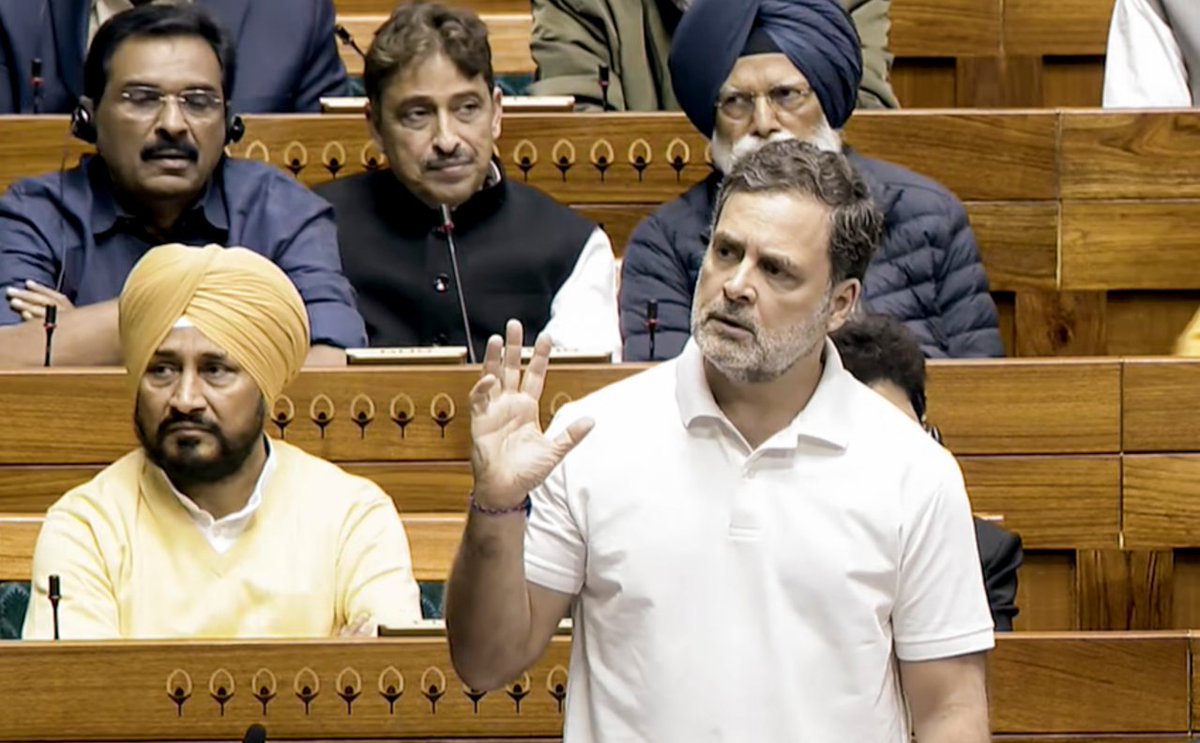

Don't you feel guilty about selling Bharat Mata Rahul Gandhi criticizes the US accord and the Center
Speaking in the Lok Sabha following days of deadlock, Rahul Gandhi criticized the Central government, led by Prime Minister Narendra Modi, for the recently concluded trade agreement with the United States, saying the administration should be embarrassed of it. In a vicious attack, Gandhi said that the Center "sold India" and that the government was endangering farmers' livelihoods by permitting US goods to enter."India is no longer yours. Do you not feel guilty for selling India? In reference to the trade deal, he declared, "You have sold our mother, Bharat Mata." He added that it was a "wholesale surrender" in which the interests of farmers were jeopardized and India's energy security was given to America. Gandhi went on to say that Donald Trump would have been advised to treat India equally if an INDIA Bloc administration had negotiated the trade deal with the US."This is total capitulation. The fact that it is a capitulation by more than simply the prime minister makes it tragic. He has given up the 1.5 billion Indians' future. Gandhi claimed that he had given up the future in order to save the BJP's financial structure, which is the subject of a case in the US.Gandhi claimed that the farmers' interests had been compromised and that they were facing a "storm" as American agricultural products flooded Indian markets. Additionally, he claimed that the Indian textile sector is "finished."We are about to enter a period of unrest, and the country has been sold. The country is sold out. "Its farmers and data have been sold," Gandhi reaffirmed as he wrapped up his remarks.Following Rahul Gandhi's address, Union Parliamentary Affairs Minister Kiren Rijiju declared that no one could sell India and charged that the Congress party was undermining the nation. "Congress is sad because India is progressing," he stated, asserting that Prime Minister Narendra Modi is India's strongest PM. He claimed that before leaving Parliament, the Congress MP gave speeches full of falsehoods and unfounded accusations. Rijiju remarked, "He never stays back to hear the minister's response."It is regrettable that we lack a serious personality or a person with a serious character that would be appropriate for the role of opposition leader. Rahul Gandhi's lies will be refuted by our party both within and outside the House.
Published 11 Feb 2026 11:10 PM
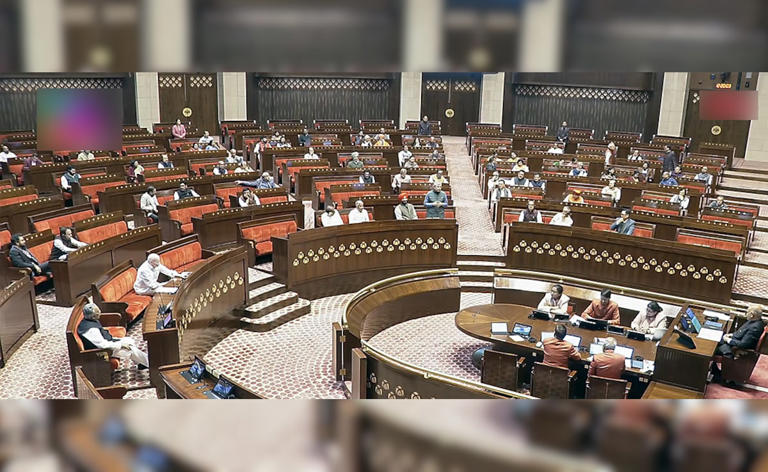

Updates for the 10th day of the Parliament Budget Session The Government-Opposition deadlock ends, and both Houses begin discussing the budget
The Lok Sabha began discussing the Union Budget on Tuesday, February 10, 2025, in the afternoon, signaling the end of the impasse between the opposition and treasury benches. The discussion had been delayed for days due to the opposition's insistence that LoP Rahul Gandhi be given the opportunity to speak on a number of topics. Following two adjournments, the House reconvened at 2 p.m., and the Speaker, Krishna Prasad Tenneti, invited Congressman Shashi Tharoor to commence the debate. The Thiruvananthapuram MP then began discussing the matter. Soon after opposition parties filed a notice to introduce a motion to oust Om Birla as Speaker of the Lok Sabha, the thaw occurred. Sukhendu Sekhar Roy of the Trinamool Congress emphasized that rising inequality could cause a "social upheaval," akin to what was seen in neighboring countries, as opposition parties criticized the government for failing to address issues like unemployment and inflation in the Union Budget during the budget discussion."If the situation is not brought under control, I fear that the country will soon experience social unrest similar to what has recently occurred in some of our neighboring countries. We have never witnessed such skyrocketing inequality between the rich, super rich, upper middle class, middle class, and the poor," Mr. Roy stated.
Published 11 Feb 2026 11:06 PM

India displays its entire armed might on the 77th Republic Day, with Operation Sindoor taking front stage on the Kartavya Path.
Top national leaders and prominent foreign visitors joined the festivities, which had as their subject 150 years of "Vande Mataram." About 10,000 distinguished guests saw the parade, which combined military might with cultural cohesion.At its 77th Republic Day parade on Monday, January 26, 2026, India put military might front and centre. Kartavya Path was transformed into a sweeping display of missiles, armour, mechanised columns, and combat aircraft, with a keen focus on weapon systems related to Operation Sindoor, the high-intensity military operation carried out in May of last year.The BrahMos supersonic cruise missile, Akash air defence system, Suryastra rocket launcher, and Arjun Main Battle Tank were among the major armament systems on exhibit at the start of the military demonstration, which emphasised India's focus on battlefield readiness and domestic defence manufacturing. A large portion of the equipment on exhibit was either used in Operation Sindoor, the confrontation with Pakistan that took place from May 7–10, or it was directly inspired by lessons learnt.A tri-services tableau featuring replicas of key weapon systems used during the operation was a big draw. A glass-cased integrated operational command centre served as its focal point, providing a visual representation of Operation Sindoor's execution through the coordinated use of systems including the S-400 air defence system and BrahMos. Akash and S-400 systems were depicted as offering a protective air-defense shield during the fight, while BrahMos missiles were predicted to perform decisive offensive attacks.Lt. General Bhavnish Kumar, a second-generation officer and General Officer Commanding, Delhi Area, led the procession. The Indian Army demonstrated a phased "Battle Array Format," including its airborne component, for the first time. The reconnaissance element included high-mobility reconnaissance vehicles after the historic 61 Cavalry in active battle uniform. Flying in Prahar formation, the domestic Dhruv Advanced Light Helicopter and its armed counterpart Rudra displayed aerial battlefield shaping.
Published 27 Jan 2026 09:07 PM
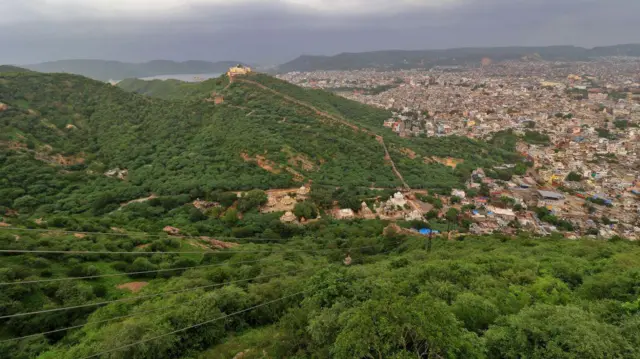

Why rising demonstrations are centered around India's Aravalli hills
The Supreme Court's redefinition of the Aravalli hills, one of the oldest geological formations in the world, which encompass the states of Rajasthan, Haryana, Gujarat, and Delhi, has sparked protests throughout northern India. Any landform rising at least 100 meters (328 feet) above the surrounding terrain is considered an Aravalli hill under the revised definition, which the court adopted in response to proposals from the federal government. An Aravalli range consists of two or more of these hills within 500 meters of one another, as well as the terrain in between. Environmentalists contend that classifying Aravalli hills according to height runs the risk of leaving many lower, scrub-covered but ecologically significant slopes vulnerable to mining and development. However, according to the federal government, the new definition is intended to increase uniformity and reinforce regulations rather than weaken rights.Protests have erupted across northern India after the Supreme Court redefined the Aravalli hills - one of the world's oldest geological formations spanning the states of Rajasthan, Haryana, Gujarat, and the capital, Delhi.
Published 22 Dec 2025 10:25 PM


Government News
Government News & Trends where we share you the latest updates under the government authorities globally starting from India to USA, China, Russia, Pakistan, UK and many more nations.
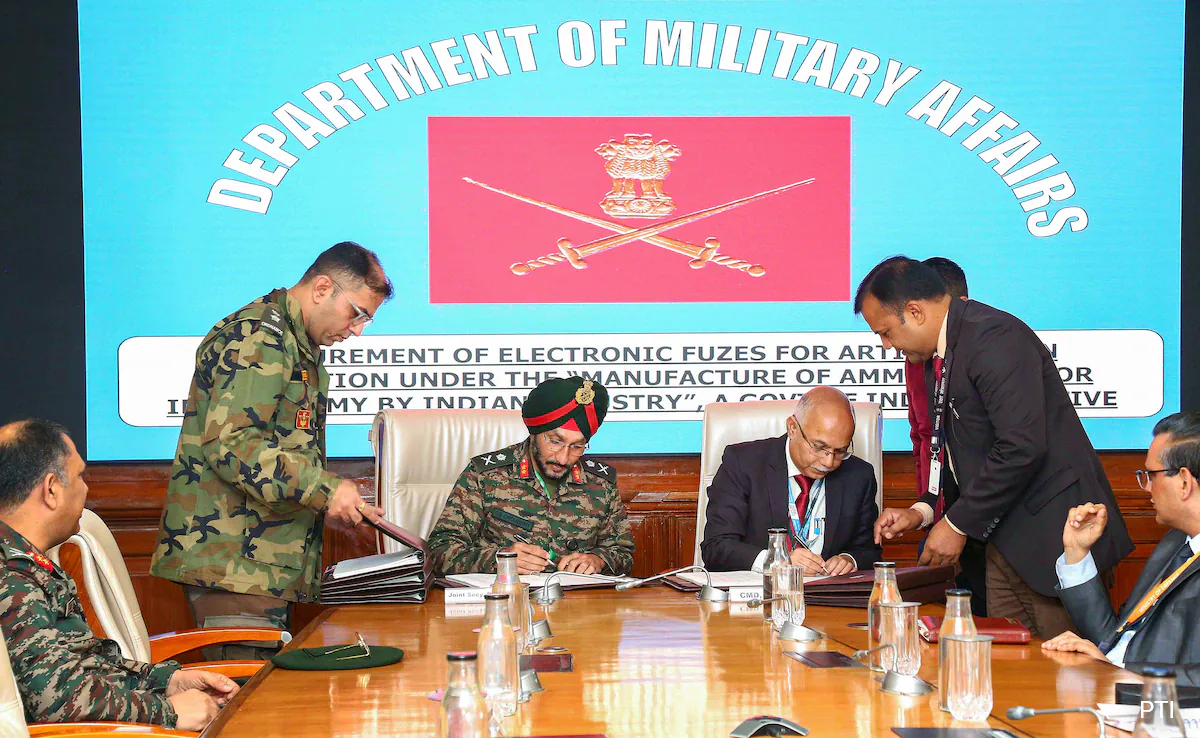

The defense budget for 2024–2025 is estimated to be ₹ 6.21 lakh crore in the interim budget.
The government on Thursday unveiled an ambitious plan for "deep-tech" technologies in the military sphere and modestly raised the defense budget from ₹ 5.94 lakh crore to ₹ 6.21 lakh crore for 2024–2025. A sum of ₹ 1.72 lakh crore was allocated to the military for capital expenditures, which primarily comprise the acquisition of new weaponry, aircraft, warships, and other military hardware, in the interim Union budget that Finance Minister Nirmala Sitharaman presented in Parliament. The budgetary allotment for capital expenditure in 2023–2024 was ₹ 1.62 lakh crore.The finance minister also announced that a new scheme will be launched for strengthening deep-tech technologies for defence purposes and to expedite 'atmanirbharta' or self-reliance in the area.The Ministry of Defence (Civil) will receive ₹ 15,322 crore, the defense services will receive ₹ 2,82,772 crore, and defense pensions will receive ₹ 1,41,205 crore. The total revenue expenditure has been estimated at ₹ 4,39,300 crore. Amounts ₹ 40,777 crore and ₹ 62,343 crore, respectively, have been set aside for aircraft and aero engines and "other equipment" in the capital outlay for defence services. ₹ 23,800 crore has been allocated for the naval fleet, while ₹ 6,830 crore is for projects involving naval dockyards. The Indian Air Force incurred the largest capital outlay of ₹ 57,137.09 crore in the budget for 2023–24. This amount comprised ₹ 15,721 crore for the purchase of aircraft and aero engines and ₹ 36,223.13 crore for other equipment. For 2024–2025, the Army's revenue expenditure is estimated to be ₹ 1,92,680 crore, while the Navy and Indian Air Force will receive ₹ 32,778 crore and ₹ 46,223 crore, respectively.The overall defense budget allocation, according to Dr. Laxman Kumar Behera, Associate Professor at the Jawaharlal Nehru University's Special Centre for National Security Studies, is modest overall and reflects the government's priorities for the military. "The allocations did not show any lack of commitment to the armed forces," he stated to PTI.Additionally, Dr. Behera characterized the ₹ 10,000 crore increase in capital expenditure outlay as a "healthy sign".
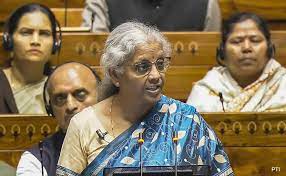

The last budget before the polls had the slogan "Developed India By 2047" and no tax changes.
Delhi, New: Union Finance Minister Nirmala Sitharaman stated on Thursday morning during the reading of a statement of the nation's finances in a special session of Parliament that there will be no changes to the income tax slabs, which have been lowered and rationalized, in the 2024 interim Budget. "I propose to retain the same tax rates for direct and indirect taxes, including import duties," said Ms. Sitharaman. Nonetheless, she suggested that unpaid direct tax demands of up to ₹ 25,000 until FY09/10 and up to ₹ 10,000 for FY10/11 to FY14/15 be withdrawn, claiming that this would help approximately one crore taxpayers. Ms. Sitharaman commented, "... there are a lot of small-scale, unverified, unreconciled, or contested direct tax demands, many of which date back to 1962, which are still on the books, worrying honest taxpayers... I would like to remove these unfulfilled direct tax demands."Regarding the overall tax situation, the Finance Minister reported that over the previous ten years, direct collections had more than tripled and that the number of individuals filing returns had increased by 2.4 times. Given that this is an interim budget, intended primarily to fund government operations until a new administration is elected and assumes power later this year, the suspension of tax slab revisions was not surprising.
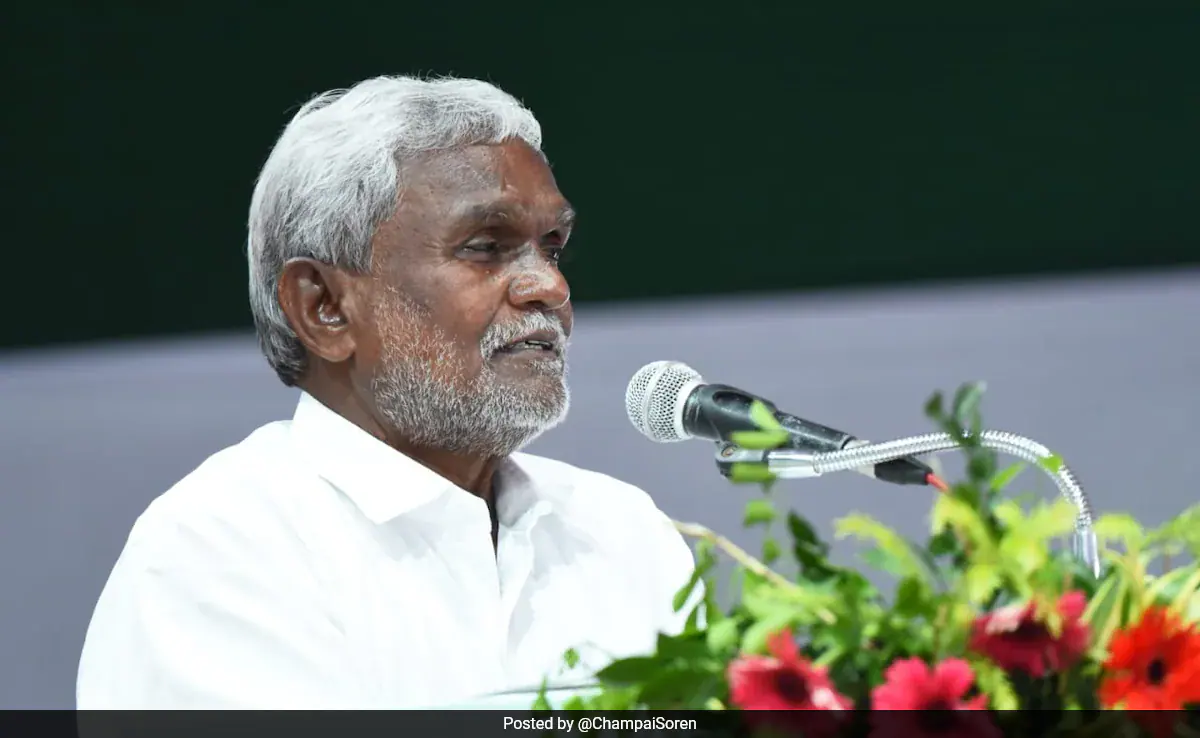

Champai Soren meets with the governor, saying, "No Government In Jharkhand For 18 Hours"
"There is no government in Jharkhand for 18 hours now and a situation of confusion has emerged, Chief Minister-in-waiting Champai Soren has told Governor CP Radhakrishnan, urging him to take immediate steps for government formation. Along with five other MLAs from the JMM, Congress, and RJD alliance, Mr. Soren met with the governor this evening. Mr Soren was yesterday chosen the legislative party leader of Jharkhand Mukti Morcha (JMM) after Hemant Soren stepped down as the Chief Minister and was arrested by the Enforcement Directorate in a corruption case.Champai Soren wrote to the Governor stating that he had sent a letter of support, signed by 47 MLAs from JMM, Congress, and RJD, to the Governor yesterday. This number is greater than the majority of the 81-member Assembly. The MLAs had accompanied him to the Raj Bhavan, he continued, but they were not permitted inside.""Sir, the state has been without a government for the past eighteen hours. There is a state of uncertainty. As the head of state constitutionally, we, the MLAs, and the people of the state expect you to take prompt action to clear the air and establish a popular government to bring the state out of disarray ""in Hindi, he wrote. order to reassure the governor that he has the support of the majority, Champai Soren continued, he could bring all of the MLAs who are in his corner to his home. Hemant Soren is under investigation in relation to a rumored mafia scheme in Jharkhand involving the unlawful transfer of land ownership. "
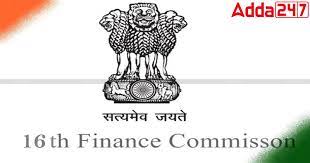

The government names one part-time and three full-time members for the 16th Finance Commission.
Soumya Kanti Ghosh, the group chief economic advisor of State Bank of India (SBI), has been selected as a part-time member.New Delhi: The finance ministry announced in a statement on Wednesday that the government has appointed three full-time and one part-time member to the Sixteenth Finance Commission (16th FC).According to the statement, the commission's full-time members are Niranjan Rajadhyaksha, executive director of Artha Global, former special secretary for expenditures and member of the 15th Finance Commission Ajay Narayan Jha.It further stated that Soumya Kanti Ghosh, the group chief economic advisor for State Bank of India (SBI), has been selected as a part-time member.According to the announcement, "it has been requested that the Sixteenth Finance Commission make its recommendations available by October 31, 2025, covering an award period of 5 years commencing 1st April, 2026."In order to propose a devolution formula for tax income between the Center and states, the government last month named Arvind Panagariya, a professor at Columbia University and former vice-chairman of NITI Aayog, as the 16th chairman of the Federal Communications Commission (FC).The government announced the terms of reference (ToR) for the 16th commission on November 29. In addition to reviewing the current arrangements for financing disaster management initiatives, the ToR asked the body to recommend ways to augment state resources for local bodies. Panagariya's appointment order was issued approximately one month later. Ritvik R. Pandey, a joint secretary in the Department of Revenue and an AS officer from the 1998 batch, was assigned as an officer on special duty for the 16th Finance Commission's advance cell on November 6th, with the rank and compensation of an extra secretary."The allocation between the States of the respective shares of such proceeds and the distribution between the Union and the States of the net proceeds of taxes which are to be, or may be, divided between them under Chapter I, Part XII of the Constitution," stated the original set of rules for the commission.The second ToR states, "The principles which should govern the grants-in-aid of the revenues of the States out of the Consolidated Fund of India and the sums to be paid to the States by way of grants-in-aid of their revenues under article 275 of the Constitution for the purposes other than those specified in the provisos to clause (1) of that article."The third treaty on resources (ToR) deals with the actions required to increase a state's consolidated fund in order to augment the resources of municipalities and panchayats, based on the recommendations of the corresponding state finance commissions.According to the statement, the 16th FC may examine current arrangements for funding disaster management activities while taking into account the funds established under the Disaster Management Act and offer pertinent recommendations.
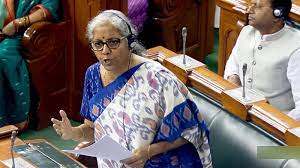

Budget 2024 For a few hours of Budget presentation, preparations start 6 months in advance know why
Union Budget 2024: On Thursday, February 1, 2024, Finance Minister Nirmala Sitharaman is scheduled to deliver the Interim Budget 2024. Every budget includes some items that address the needs of various government agencies, states, union territories, and citizens from all walks of life in India. For those in business and the salaried class, it is one of the most anticipated occasions of the year. During their potentially multi-hour speech, the finance minister makes several significant announcements. But it takes six months to develop the budget that is presented in a few hours. Are you aware of the reason? Be aware of thisInterim Budget 2024: What can we expect when Finance Minister Nirmala Sitharaman presents the Interim Budget 2024 on February 1, 2024? A member of the salaried class for tax breaks; an entrepreneur for programs that support entrepreneurs; an experienced businessman for regulations that can protect their company or boost their earnings.For this reason, most Indians pay attention to the significant statements made by the finance minister during their annual speech. These announcements contained in the budget speech could be made in a few minutes or several hours. However, the preparation time for a speech that lasts only a few hours is about six months.Interim Budget 2024: On February 1 at 11 a.m., Union Finance Minister Nirmala Sitharaman is scheduled to read the Interim Budget 2024 in the Parliament. The Interim Budget, which will implement the major decisions taken by the Center, is the focus of attention. Prior to the Lok Sabha elections, the departing government presents the interim budget during the budget session. After winning the Lok Sabha elections, the newly formed government then presents the comprehensive budget.In addition to discussing the government's accomplishments since 2014, FM Sitharaman's Interim Budget is anticipated to look ahead to Amrit Kaal in 2047. Similar to the previous interim budget, the Budget 2024 paper is anticipated to provide historical context, assess the current situation, and outline plans for the future. A summary of the government's anticipated revenue and outlays through the formation of the next government is the primary purpose of the interim budget. A comprehensive budget, on the other hand, addresses every facet of government funding, including receipts and outlays as well as allocations and policy declarations. A full-year budget outlines the nation's economic course for the whole fiscal year and acts as a strategic plan. The financial data for the transitional phase is provided by the interim budget.The timeline for presenting an interim budget is identical to that of the Union budget during a regular fiscal year. The Interim Budget has grown in importance for the ruling administrations in recent years as a tactical instrument for national elections. It enables them to outline the ruling party's economic strategy and provide justification for reelection.Some significant modifications were announced by former FM Piyush Goyal in the most recent interim budget: > Earnings up to Rs 5 lakh are exempt from income tax; individuals with gross incomes up to Rs 6.5 lakh are exempt from paying taxes if they invest in authorized stocks and provident funds. The TDS level on interest on bank and post office deposits was raised from Rs 10,000 to Rs 40,000. The TDS barrier on rental income was increased from Rs 1.8 lakh to Rs 2.4 lakh. The standard tax deduction for salaried individuals was raised from Rs 40,000 to Rs 50,000. I-T will process returns in a day.> In the following two years, all tax return verification will be completed electronically without involving the taxpayer. a bundle of Rs.The 74-page report, "The Indian Economy: A Review," authored by Chief Economic Advisor V Anantha Nageswaran, was delivered by the NDA administration this year. It provided an assessment of India's economy and outlined difficulties for the upcoming fiscal year. "This is not the Department of Economic Affairs' Economic Survey of India. Following the general elections, it will take precedence over the entire budget. The paper titled "Indian Economy–A Review" stated, "This review offers a brief sketch of the outlook for the economy in the coming years and takes stock of the state of the Indian economy and its journey over the last ten years." Following the presentation of the Interim Budget, a vote-on-account is held by the Parliament. This clause enables the government to secure parliamentaryA complete budget and an interim budget are comparable. One significant distinction is that it covers forecasts for a shorter time frame instead of the whole fiscal year. Without requiring a formal discussion, Parliament can pass a vote-on-account that just addresses spending.
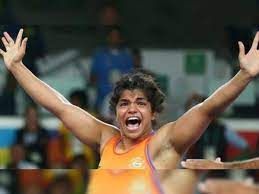

Sakshi Malik, a wrestler, claims that the chief of false titles is suspended. The ministry of sports issues a legal notice.
Malik appealed to the sports ministry about the situation, questioning how a federation member who was suspended could embezzle money from the WFI.Olympic wrestler Sakshi Malik accused the suspended chairman of the wrestling federation of India (WFI), Sanjay Singh, on Tuesday of organizing championships and giving phony certificates, a month after the Central government suspended the WFI panel.Malik appealed to the sports ministry about the situation, questioning how a federation member who was suspended could embezzle money from the WFI. She said that athletes would run into problems if they presented phony credentials."The National Wrestling Championship is being run by Sanjay Singh, an associate of Brij Bhushan, as per his wish and he is giving fake certificates to the players, which is illegal," Malik said in a post on X, the previous Twitter platform.She continued by saying that the Sports Ministry was planning to host the national wrestling championship in Jaipur and that Singh was staging a phony tournament in order to "assert his dominance.""To demonstrate his superiority in wrestling, Sanjay Singh is forging and distributing fake certificates of several national championships before of the Sports Ministry's scheduled wrestling national championship in Jaipur. How is it possible for an individual under suspension from the organization to embezzle its funds?Malik went on to say that these certificates can result in the players being punished. "Action will be taken against the poor players when they go tomorrow to ask for jobs with these certificates." However, the players are not at fault.She urged Anurag Thakur, the minister of sports, to investigate the matter. "Sanjay Singh should be held accountable right away for his fraudulent actions, as he continues to conduct fraudulent acts even after his activities have been prohibited. Malik stated, "I beg the Sports Minister, Shri Anurag Thakur ji, to look into this matter and prevent the players' futures from being spoiled."Malik included an image of the purportedly fraudulent credentials being given to athletes in the article. Sanjay Singh received a severe warning from the Sports Ministry about possible legal consequences. Singh recently made "baseless and mischievous" comments about the government's recognition of WFI, to which this is in reaction. The ministry made it clear that any competition run by the WFI would not be accepted as "sanctioned."According to PTI, Singh had previously declared that almost 700 wrestlers would compete in the Senior National Championship, which would take place in Pune from January 29 to January 31.The ministry wrote to Singh, stating, "Again, you are making completely baseless and mischievous claims regarding the recognition of the Executive Committee of the WFI that is currently under suspension and about the competitions that you are holding in Pune."


Nitishs Return to NDA: Its Wrong to Conclude a Cakewalk for the BJP in Bihar
“The BJP, of course, has got psychological advantage by bringing the Bihar CM and Janata Dal (United) president from the INDIA bloc, of which he was the architect. But there is a palpable anger among the people against Nitish. The BJP will have to pay the price for accepting him back to its fold,” the election strategist turned activist, Prashant Kishor said.Kishore predicted, “Irrespective of whatever alliance Nitish contests with, his party won’t be able to win more than 20 seats in the assembly polls.” Kishore, who is on his Jan Suraj padyatra in north Bihar’s Begusarai district these days, has been advancing this argument in his speeches as well as his interviews with the media. The widely held ‘assumption’ that the BJP’s victory is a “done deal” particularly after Nitish jumping to its side has subsumed the likely troubles that the Hindutva party might face in the run-up to the Lok Sabha elections, expected in April-May, this year.The first and foremost trouble which the BJP is all set to face is over sharing of seats. Nitish’s JDU and the Lok Janshakti Party (LJP) of Ram Vilas Paswan (alive then) were the part of the BJP led National Democratic Alliance (NDA) in 2019. The BJP and the JDU had shared 17 seats each, sparing six seats for the LJP. The NDA had won 39 seats—BJP-17, JDU-16 and LJP-6. Now, besides Nitish’s JDU, the BJP has Upendra Kushwaha’s Rashtriya Lok Samata Party (RLSP), Jitan Ram Manjhi’s Hindustani Aawam Morcha – Secular (HAMS), Chirag Paswan’s LJP and his uncle Pashupatinath Paras’s Rashtriya Lok Janshakti Party (RLJP) are in the NDA. Creating a buzz in the name of Ram temple and around Prime Minister Narendra Modi’s ‘persona’, the BJP cadres are clamouring for more seats than what they had contested in Bihar in 2019. The RLSP, the HAMS, the LJP and the RLJP, which have been with the BJP from before Nitish’s JDU has joined it, are, obviously, expecting their share of seats. There are only 40 seats in the state to share with. How many seats the BJP will keep in its share and how much will it spare for its five other partners? Needless to say that there is an apparent disquiet in the camps of these parties on Nitish’s return in the NDA; their lack of enthusiasm was obvious at Nitish’s ninth swearing-in as the CM at Patna’s Raj Bhavan on Saturday-January 28.
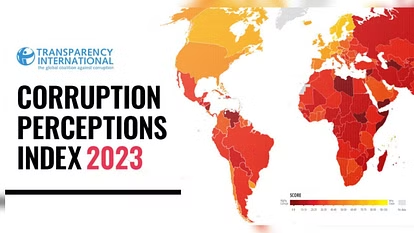

Global Corruption Index 2023: India Ranks 93rd Out of 180 Countries, Was 85th in 2022
The index comes at a time when the Union government run by the Bharatiya Janata Party is targeting only opposition leaders through its investigating agencies – ostensibly to weaken their public appeal before the crucial 2024 general elections and project the INDIA alliance as corrupt.Significantly, of India’s 28 states, BJP and its allies were in power in 17 in 2023. As per the country-wise corruption perception index (CPI) of the report put together by Transparency International (TI), a noted platform that works in over a hundred countries to fight corruption and promote transparency in public life, India has slipped from 85th position in 2022 to 93rd in 2023. In all, TI ranks 180 countries in terms of their perceived levels of public sector corruption in a scale of 0 to 100; the perceived levels are drawn from consultations with experts and people in business in the respective countries. Those closer to the scale of 100 are perceived to be highly corrupt. While India stands at 93, the country’s overall score for 2023 stands at 39, one point lower than 2022. About India, the TI report states, “India (39) shows score fluctuations small enough that no firm conclusions can be drawn on any significant change. However, ahead of the elections, India sees further narrowing of civic space, including through the passage of a bill that could be a ‘grave threat to fundamental rights’.”Among India’s neighbours, China is shown at a score of 42 (against India’s 39) but the report cautions that the country’s heavy reliance on punishment rather than institutional checks on power raises doubts over the long-term effectiveness” of its anti-corruption measures. China, which has been grabbing headlines for cracking down on corruption, has punished over 3.7 million public officials in the last 10 years.


Nasscom wants government to let overseas Indian startups list directly
India-focused startups incorporated overseas should be able to list on the domestic stock exchanges within the existing externalised structures, Indian industry body National Association of Software and Service Companies (Nasscom) has suggested as part of its Union Budget 2024-25 recommendations.Out of 139 startups who participated in a survey conducted by Nasscom, approximately 16.5% of Indian-origin startups have externalised legal structures and would consider raising equity capital through public listing in India if the regulations are amended to allow for a direct listing, it said.Out of 139 startups who participated in a survey conducted by Nasscom, approximately 16.5% of Indian-origin startups have externalised legal structures and would consider raising equity capital through public listing in India if the regulations are amended to allow for a direct listing, it said.India-focused startups incorporated overseas should be able to list on the domestic stock exchanges within the existing externalised structures, Indian industry body National Association of Software and Service Companies (Nasscom) has suggested as part of its Union Budget 2024-25 recommendations. Previously, the industry body had reached out to the markets regulator Securities and Exchange Board of India (Sebi) and the finance ministry seeking a viable framework for such listing. This is the first time it has been part of the Budget suggestions, said Ashish Aggarwal, head of public policy, Nasscom.Existing rules permit only domestically incorporated firms from listing in India. The move could pave the way for reducing considerable tax liabilities for both the company and its investors in the event of ‘reverse flipping’ or moving registration to India.For the Budget, it has recommended to “set up an expert task force, with participation from the relevant government departments, regulators, industry representatives and legal experts, to recommend a comprehensive set of measures to make direct listing an attractive option for Indian origin foreign start-ups to consider.”
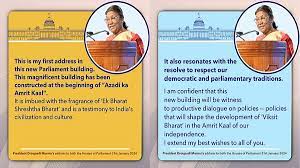

Confident new Parliament building will have productive dialogues, says President Murmu
“We anticipate the Interim Budget 2024 to align with the government’s mission of uplifting the underprivileged and urge the government to introduce beneficiary schemes, especially as the General Sabha election approaches, focusing on the socio-economic empowerment of the marginalised.”“We hope for policies supporting our growth, particularly in Tier 2, 3, and 4 cities, aiming to integrate rural communities into the formal banking system.Incentivising FinTech dedicated to empowering SMEs through financial and technical interventions would mark a significant stride. Addressing loan disbursement including loans against gold/jewellery, we recommend regulations fostering collaboration between traditional banks and digital lenders for accessible loans,” Anuj Arora, Co-founder & COO, SahiBandhu Gold Loans said.“As we approach Budget 2024, we anticipate a continued focus on advancing India’s digital public infrastructure, a key pillar for realising the $5 trillion economy dream. I look forward to enhanced government initiatives fostering financial inclusion benefiting ‘Bharat’, not just India,” said Sarvjeet Virk, Co-founder & MD, Finvasia. “On the tech front, I hope to see further progress in establishing AI Centres of Excellence. I also expect more policies to enable public-private partnership to boost end-use-cases of generative and predictive AI and increase its adoption in India. The fintech industry, as usual, will be the flag bearer of innovation,” Virk added. “The landscape of online new car sales has experienced a substantial surge over the past 4-5 years, driven by an increasing preference for consumers buying cars digitally. We are expecting some key developments from the budget like a reduction in the GST rate that will support home-grown players in investing in newer technologies for enhanced mobility offerings on a global scale. Then, re-evaluation of the import structure for electric vehicles is also sought to address disparities in GST rates, providing a much-needed boost to the start-up community through government loans and investments. As an online new car market player, we are closely monitoring these developments, recognizing their potential impact on the electric vehicle market. Our commitment is to adapt our platform to the evolving landscape, ensuring that our customers have access to the latest and most sustainable automobile options. We look forward to the Union Budget introducing measures that not only support the growth of the electric vehicle industry but also contribute to a more sustainable and eco-friendly future,” Gaurav Aggarwal, CEO and Founder, CarLelo, A Capri Loans Venture said.
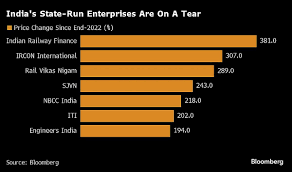

Stocks & sectors likely to benefit from 2024 Interim Budget
Companies building roads, ports and airports are on traders’ watchlist as Prime Minister Narendra Modi’s administration is set to present its last budget before the national elections. Shares linked to rural spending and state-owned firms are likely to be a focus area in Finance Minister Nirmala Sitharaman’s budget speech on Thursday, as policymakers seek ways to boost demand in the vast rural hinterland. Development of highways, tunnels and power plants is among the key focus areas for the government, which has more than doubled its capital spending over the last three years. Modi has made infrastructure building a cornerstone of his economic policy, helping India expand faster than any other major economy. The optimism seeped into the nation’s stock markets, which have advanced in all but one year since Modi first came to power in 2014. The enthusiasm has waned a bit this month, with foreign investors taking out more than $2.6 billion from local equities.The Feb. 1 budget is an interim one until a new administration takes office. It will still be keenly followed as the proposals would provide an indication on the government’s assessment of the economy, with Modi widely expected to win a third term in the elections due around April-May.


Before polls, stocks are expected to benefit from the governments interim budget.
As the government of Prime Minister Narendra Modi prepares to unveil its final budget before the national elections, traders are keeping a close eye on companies that are involved in road, port, and airport construction. In her budget speech on Thursday, Finance Minister Nirmala Sitharaman is expected to highlight shares associated with state-owned companies and rural spending, as policymakers look for ways to increase demand in the vast rural hinterland.Building infrastructure has become a key component of PM Modi's economic strategy, enabling India to grow faster than any other major economy. The nation's stock markets, which have increased in all but one year since PM Modi took office in 2014, began to show signs of optimism. This month, foreign investors withdrew more than $2.6 billion from local equities, indicating a slight decrease in enthusiasm. Spending on Infrastructure One of the government's main priorities is the construction of power plants, highways, and tunnels; during the past three years, capital spending has more than doubled.The main winners of this policy push have been the shares of industrial and capital goods companies, ranging from billionaire Gautam Adani's conglomerate to engineering behemoth Larsen & Toubro. Over the past year, BSE Ltd.'s sectoral gauges of capital goods and industrial firms have increased by over 70%, outpacing the benchmark index's 17% gain. Vinit Sambre, head of equities at DSP Mutual Fund, said over the phone, "A lot of the market performance has come from the capex cycle; equity investors would want to see that momentum continue." "Any guidance on the capex path will be closely watched."
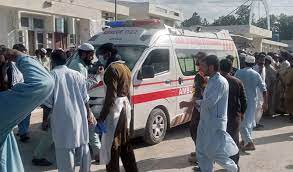

Four killed by bomb explosion near Pakistan political rally
At least four people were killed Tuesday in a bombing near a Pakistan political rally, officials said, as the nation prepares to go to the polls next week.Police in the Balochistan provincial capital of Quetta said a bomb planted on a motorbike detonated as supporters rallied for the Pakistan Tehreek-e-Insaf (PTI) party of jailed ex-prime minister Imran Khan."The PTI rally was passing by there but it is not clear whether the rally was a target or not," senior police official Farhan Zahid told AFP.The 71-year-old former cricket star was ousted from office in 2022 and launched a campaign of defiance against Pakistan's military kingmakers, who he said conspired to end his premiership.Last year saw casualties hit a six-year high, with more than 1,500 civilians, security forces and militants killed, according to the Islamabad-based Center for Research and Security Studies.Islamabad has blamed the rise in attacks on the Taliban, saying they are not doing enough to root out militancy in Afghanistan. Waseem Baig, a provincial health department spokesman, said six people were wounded in addition to the four killed.In a statement, PTI said three of its activists were among the dead at the rally -- a convoy of motorbikes and cars parading through the city to curry support for a candidate ahead of national elections scheduled for February 8.A party spokesman told AFP it was too soon to say whether they had been deliberately targeted.The attack came just hours after PTI founder Khan was sentenced to ten years in prison on charges of having leaked classified state documents.Khan and PTI say they are suffering under an unprecedented crackdown designed to prevent their return to power through the February 8 poll.Since then he has been buried under an avalanche of legal cases and barred from standing for office, whilst PTI has been largely squeezed out of the public sphere.Pakistan has also been suffering from a security crisis, with a dramatic uptick in militant attacks since the Taliban returned to power in neighbouring Afghanistan.
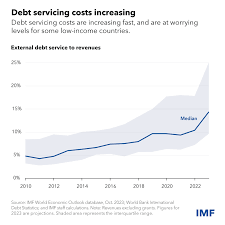

How to Ease Rising External Debt-Service Pressures in Low-Income Countries
WASHINGTON DC, Jan 29 (IPS) - As 2024 starts, the good news is that there haven’t been any notable requests by a low-income country for comprehensive debt relief since Ghana’s, more than a year ago. Despite this, vulnerabilities remain, with high debt servicing costs a growing challenge for low-income countries. Financing pressures due to relatively high interest payments and the pace at which low-income countries need to repay debt are straining budgets. That prevents these countries from spending more on essential services or the critical investment needed to attract business, create jobs, improve prosperity, and build climate resilience.One important metric is the share of revenues the government collects from its population through taxes and other fees that goes to pay its foreign creditors. While the scale of the burden differs greatly across countries, it’s generally about two and a half times higher than a decade earlier.In addition, central banks have significantly raised borrowing costs to tame inflation. That makes it costlier for governments to raise new debt or refinance existing debt. While central banks may be done raising rates, it is not clear when they will start to cut, and this uncertainty may be reflected in volatile financial market conditions. This means for a typical low-income borrower the share has risen to about 14 percent, from about 6 percent, and as much as 25 percent, from about 9 percent in some economies. This is one of the key indicators used in the framework for assessing debt sustainability that signals a country might be at risk of needing financial support from the IMF or of missing a debt payment.Low-income countries also have significant debt repayments falling due in the next two years. They need to refinance about $60 billion of external debt each year, about three times the average in the decade through 2020.But with many competing demands for financing, including from advanced and emerging market economies that are also trying to adapt to climate change, there’s a significant risk of a liquidity crunch—failure to raise sufficient financing at an affordable cost. That could in turn lead to a destabilizing debt crisis.One factor was higher government borrowing and deficits to mitigate the impact of the pandemic and other external economic shocks. This has increased the level of debt and consequently the cost of servicing it. It’s encouraging that this trend is reversing as countries bring primary deficits back in line with pre-pandemic levels.
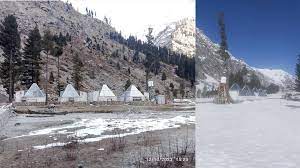

Snow Tales: Too Little, Too Late, Say Climate Experts
KARACHI, Jan 29 (IPS) - Whether the late snow in Pakistan’s Gilgit-Baltistan region is an anomaly or an indication of the impacts of climate change, which brings erratic and at times devastating weather patterns, experts in the region believe not enough is being invested in the development of capacities, systems, and infrastructure to improve resilience. Alpine skier, 28-year-old Muhammad Karim, has spent the winter with his eyes skyward, wishing and hoping for deep and abundant snow.“My bread and butter depend on the snow,” said the Olympian, who is also a ski trainer, at Naltar Ski Resort, in the valley by the same name nestled in the Gilgit-Baltistan’s Karakoram mountain range.Without prolonged cold winter days to follow the snowfall, the snow will melt away, said Sarfaraz, continuing: “Nor will it compensate for the almost 80–90 percent less precipitation the country faced in December and January.”“Winter has been milder,” he said, due to the El Niño effect. The temperatures recorded by the seven weather stations, however, show “an increase by 0.5 degree Centigrade in the region, on average, since 1983, and a decrease of precipitation (rain and snow) by 8.4 mm,” said Shigri. Heading the ice-hockey and alpine skiing section run by the Ski Federation of Pakistan and with the national skiing competition looming just weeks away (held between February 14 and 20 in Naltar), Karim had been getting sleepless nights as it had not snowed after a slight sprinkling of “half an inch” in November, and there were chances the sporting event would be called off.But as predicted by the Meteorological Department, the snowfall began on January 28 and “will continue for a few days,” said Karachi-based Dr. Sardar Sarfaraz, chief meteorologist at the Pakistan Meteorological Department. “It’s too light,” said Karim, talking to IPS over the phone from Naltar. “We are still uncertain about the event,” he added.This year has been quite unusual. It has been an almost snowless winter in the northern region of the Himalayan-Hindukush-Karakoram ranges.“We usually experience the first snowfall by the end of October in some parts of G-B, and this continues well into March,” said Shehzad Shigri, director of the Gilgit-Baltistan Environmental Protection Agency, speaking to IPS from Gilgit city.
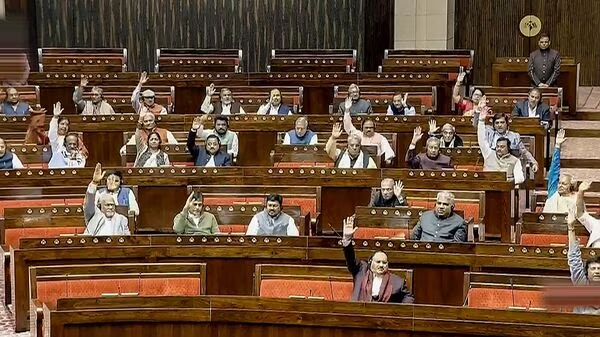

RS revokes suspension of 11 Oppn MPs held guilty of breach of privilege
The Rajya Sabha Privileges Committee on Tuesday held 11 suspended opposition MPs guilty of breach of privilege and contempt of the Council of States, but Chairman Jagdeep Dhankhar revoked their suspension allowing them to attend the Budget session, sources said.In its report to the Rajya Sabha chairman a day before the session starts on Wednesday, the committee also recommended that the period of suspension already suffered by the members be treated as "sufficient punishment" for the transgression. The MPs held "guilty of breach of privilege and contempt of the Council" of States are Jebi Mather Hisham, L Hanumanthaiah, Neeraj Dangi, Rajmani Patel, Kumar Ketkar, G C Chandrashekhar, Binoy Viswam, Sandosh Kumar P, M Mohamed Abdulla, John Brittas and A A Rahim.The committee presented the report to Dhankhar, taking note of the situation that the suspended members would not be able to attend the special address of President Droupadi Murmu to both Houses of Parliament, the first address in the new building of Parliament, on Wednesday. The committee usually submits its recommendations to the House.The sources said the chairman invoked the authority vested in him under the rules of procedure to revoke their suspension enabling the members to attend the special address by the president.The matter of 11 MPs suspended by the chairman during the Winter session of Parliament were referred to the Privileges Committee.
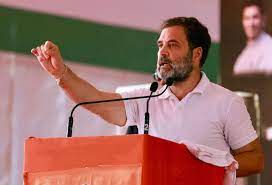

Congress slams govt over UGC dereservation row, demands to sack chairman
Stepping up attack, the Congress on Monday demanded the dismissal of UGC Chairman M Jagadesh Kumar over the draft guidelines for "de-reservation" of posts in higher education institutions, with party leader Rahul Gandhi alleging it was a "conspiracy" to end the reservation given to SC, ST and OBC categories.The party had on Sunday demanded the immediate withdrawal of the UGC's draft guidelines proposing that any vacancy reserved for SC, ST and OBC candidates can be "declared unreserved" if enough candidates from these categories are not available.Union Education Minister Dharmendra Pradhan, however, has clarified that not a single post will be de-reserved and there is no scope for ambiguity about reservations after the introduction of the Central Educational Institutions (Reservation in Teachers' Cadre) Act, 2019.In a post in Hindi on X, Gandhi claimed it was an attempt by BJP and RSS to "eliminate" the participation of deprived sections and the party demanded that Kumar should apologise to the entire backward classes. "In the new draft of UGC, there is a conspiracy to end the reservation given to SC, ST and OBC categories in higher education institutions."Today, out of approximately 7000 reserved posts in 45 central universities, 3000 are vacant, and of which only 7.1 per cent are Dalit, 1.6 per cent are tribal and 4.5 per cent are backward class professors."The BJP-RSS, which have even talked about reviewing reservation, now want to snatch the jobs of the deprived classes from such higher education institutions," Gandhi alleged."This is an attempt to kill the dreams of the heroes who have fought for social justice and to eliminate the participation of the deprived sections," he said.Gandhi said this was the difference between 'politics of symbolism' and 'real justice' and reflected the character of the BJP. He said Congress will never allow this to happen and will continue to fight for social justice. Vacant posts will be filled only with qualified candidates from reserved categories, the former Congress chief asserted.Addressing a press conference alongside Congress' SC Department chief Rajesh Lilothia, Chairman of Unorganised Workers and Employees Congress Udit Raj said after the Congress party protested against the "anti-people" move, the UGC was forced to issue a statement in the media that there is no such decision.
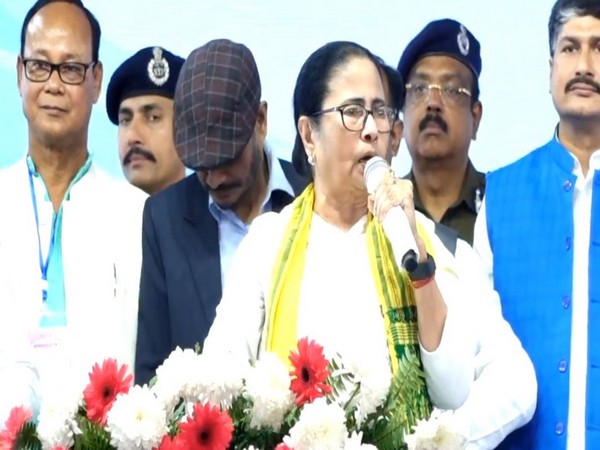

BJP again crying CAA for votes: Mamata after Union Ministers guarantee
West Bengal Chief Minister Mamata Banerjee hit out at the Bharatiya Janata Party (BJP) on Monday saying that the party has again started crying "CAA CAA" for the sake of votes as Lok Sabha elections are approaching."We have fought against the NRC. Rajbanshis are citizens of India. They have again started shouting CAA, CAA for the sake of votes," Mamata Banerjee said at a public distribution program in West Bengal's Cooch Behar on Monday.Banerjee's remarks came after Union Minister Shantanu Thakur said on Sunday that the Citizenship Amendment Act (CAA) will be implemented across the country in a week.The West Bengal Chief Minister said that her government has acknowledged all colonies as "permanent addresses," and all residents who get the benefit of various state government benefits are citizens of the country."All of you are citizens. We have given permanent addresses to all colonies. They get ration, go to school, get scholarships, get Kisan Bandhu, Shikhashree, Oikoshree, Laxmir Bhandar. How could they get these benefits if they had not been citizens? Had they been able to cast votes if they were not citizens?" Banerjee questioned. Hitting out at the central government for misusing central agencies, Banerjee said, "Do you remember the Sitalkuchi case? The CISF has earlier shot four people to death. They shoot people as if they are zamindars. If anyone oppresses you in your village, fire an FIR first. They instil fear and conduct elections through agencies."Various reports have claimed that four people were killed in West Bengal's Sitalkuchi after being fired by CISF during the assembly elections in 2021.Accusing the BJP of misusing the Enforcement Directorate and the Central Bureau of Investigation, to harass political opponents, Banerjee said, "They call leaders and say that if you do not come with us, we will send ED to your houses. What will the ED do? What will the CBI do? They are here today by they may not be there tomorrow." The CAA, introduced by the Narendra Modi government, aims to confer Indian citizenship to persecuted non-Muslim migrants - including Hindus, Sikhs, Jains, Buddhists, Parsis, and Christians - who migrated from Bangladesh, Pakistan, and Afghanistan and arrived in India before December 31, 2014. Following the passage of the CAA by Parliament in December 2019 and its subsequent Presidential assent, significant protests erupted in various parts of the country.


















